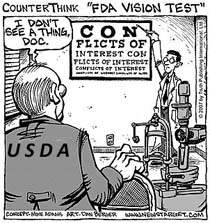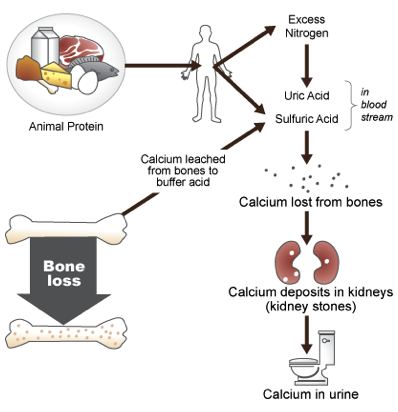
Complicated nutritional guidelines
 Why
don't our governmentally approved dietary guidelines line up with
proper human nutrition? A conspiracy theorist would say that
industry lobbyists run the tests that get unsafe food additives
approved and that their employees go to work for the USDA to make sure
that their interests are served. I think that there's a lot to be
learned by following the money trail, but I also think that there's
more to the problem.
Why
don't our governmentally approved dietary guidelines line up with
proper human nutrition? A conspiracy theorist would say that
industry lobbyists run the tests that get unsafe food additives
approved and that their employees go to work for the USDA to make sure
that their interests are served. I think that there's a lot to be
learned by following the money trail, but I also think that there's
more to the problem.
Part of the issue is
that proper human nutrition is a very complex
subject. So many of the simple "facts" that I learned about human
nutrition in school don't hold up to the light of sound science.
Don't eat fat or you'll get fat. Don't eat cholesterol or you'll
have high cholesterol. Unfortunately, our bodies aren't so cut
and dried.
Good nutrition is all
about balance. Let's look at osteoporosis,
which common wisdom says is caused by not eating enough calcium to keep
our bones strong. In reality, a handful of factors all play into
whether that calcium makes it into your bones, and a deficiency of
essential fatty acids, zinc, copper, boron, manganese, silicon, vitamin
K, magnesium, or potassium can all rob calcium from your bones.
So can eating too much animal protein, pasta, beans, nuts (except
almonds), and unsprouted grains since these foods all make your blood
acidic. To counteract acidic blood, your body yanks calcium out
of your bones --- hello, osteoporosis.
 You can also get
osteoporosis by consuming too much vitamin A without
also increasing your dose of vitamin D. The dairy industry would
have you believe that drinking their vitamin A and D fortified milk
will keep your bones strong, but the artificial vitamin D in milk isn't
used in
the right way by your body, so you might actually be doing more harm
than good by chugging that white fluid. I guess the leafy green
and broccoli industries didn't have enough cash to outcompete the dairy
industry when it came time to tell the American public how to get
calcium in our diets.
You can also get
osteoporosis by consuming too much vitamin A without
also increasing your dose of vitamin D. The dairy industry would
have you believe that drinking their vitamin A and D fortified milk
will keep your bones strong, but the artificial vitamin D in milk isn't
used in
the right way by your body, so you might actually be doing more harm
than good by chugging that white fluid. I guess the leafy green
and broccoli industries didn't have enough cash to outcompete the dairy
industry when it came time to tell the American public how to get
calcium in our diets.
The upshot is that we
need to think a little harder about nutritional guidelines we thought
we understood. We should check to see if there's a conflict of
interest involved in the recommendation and we should delve a bit
deeper into the science. Luckily, Michael Barbee did the legwork
for us with Politically
Incorrect Nutrition.
| This post is part of our Politically Incorrect Nutrition lunchtime
series.
Read all of the entries: |
Want more in-depth information? Browse through our books.
Or explore more posts by date or by subject.
About us: Anna Hess and Mark Hamilton spent over a decade living self-sufficiently in the mountains of Virginia before moving north to start over from scratch in the foothills of Ohio. They've experimented with permaculture, no-till gardening, trailersteading, home-based microbusinesses and much more, writing about their adventures in both blogs and books.
Want to be notified when new comments are posted on this page? Click on the RSS button after you add a comment to subscribe to the comment feed, or simply check the box beside "email replies to me" while writing your comment.
- Remove comment
- Remove comment
